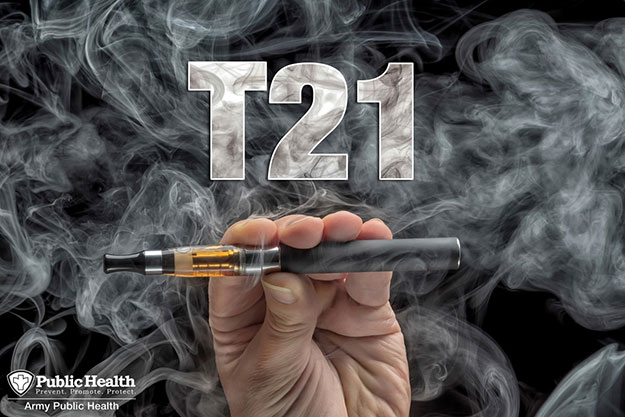(Photo: The Department of Defense is raising the minimum age for all tobacco sales to 21 years of age beginning Aug. 1. Tobacco use is the number one cause of preventable disease, disability and death in the United States.)
Although most Americans are rightfully focused on the current health threat posed by the novel coronavirus, or COVID-19, tobacco use is still the number one cause of preventable disease, disability and death in the United States.
In recognition of the long-term harm caused by early onset tobacco use, President Donald Trump signed legislation in December 2019 amending the Federal Food, Drug, and Cosmetic Act, and raising the federal minimum age for sale of tobacco products from 18 to 21 years. This legislation known as Tobacco 21, or T21, makes it unlawful for any retailer to sell tobacco products -- including cigarettes, smokeless tobacco, hookah tobacco, cigars, pipe tobacco, electronic nicotine delivery systems including e-cigarettes and e-liquids to any person younger than 21 years of age. Effective Aug. 1, the Department of Defense will no longer sell tobacco products to anyone under the age of 21, including service members.
 The Office of the Under Secretary of Defense published policy making it unlawful for any retail outlet on DoD installations and facilities within the U.S. and its territories and possessions, and on U.S. naval vessels at a U.S. port, to sell tobacco products, including electronic nicotine delivery systems, to any person younger than 21 years of age. Retail outlets are required to post signs no later than July 1 informing patrons of this policy change.
The Office of the Under Secretary of Defense published policy making it unlawful for any retail outlet on DoD installations and facilities within the U.S. and its territories and possessions, and on U.S. naval vessels at a U.S. port, to sell tobacco products, including electronic nicotine delivery systems, to any person younger than 21 years of age. Retail outlets are required to post signs no later than July 1 informing patrons of this policy change.
"Research has shown that raising the legal age of sale to 21 would likely reduce youth tobacco initiation and use," said Corey Fitzgerald, Army Public Health Center public health social worker. "Nearly all smokers start as children or young adults and these groups are heavily targeted by the tobacco industry. Early onset of tobacco use increases risks of smoking-related illnesses and death."
According to the APHC 2018 Health of the Force report, 23 percent of soldiers reported tobacco use with prevalence ranging from 8.3 percent to 31 percent across Army installations. Smokers under the age of 25 are the largest group represented. Across the age groups, the prevalence of tobacco use among male soldiers was more than double that of female soldiers.
The Centers for Disease Control and Prevention indicate if the current rate of cigarette smoking among Americans under the age of 18 continues, 5.6 million of those youths will die from a smoking-related disease. This would equate to one of every 13 Americans under the age of 18 alive today.
"APHC's challenge goal is to eliminate tobacco use from the Army by 2025," said Fitzgerald. "The soldier of 2025 is in middle school today. We highlight the Tobacco Free Living program on our website to help soldiers, family members, Department of the Army civilians, and military retirees, adopt lifestyles that prevent the initiation of tobacco use, help those who want to quit tobacco succeed, live free from the effects of second and third-hand smoke exposure, and create tobacco-free zones where children live, learn and play."
Fitzgerald says the APHC TFL website is a targeted priority in the Department of Defense Instruction 1010.10, Health Promotion and Disease Prevention.
"We continuously update the site to reflect the latest TFL evidence-based strategies and interventions," said Fitzgerald.
Fitzgerald says it's important for leaders to support the T21 policy change.
"For this policy to be effective at increasing the readiness and health of our Army, leaders at all levels need to communicate support of Tobacco 21 laws," said Fitzgerald. "Tobacco 21 with no military exemption was passed because the health of our young soldiers is just as important as their civilian peers."
The APHC "Education for Individuals" Tobacco Free Living toolkit offers a number of resource links to assist soldiers, civilians and family members with the goal of tobacco-free living.
The Army Public Health Center focuses on promoting healthy people, communities, animals and workplaces through the prevention of disease, injury and disability of soldiers, military retirees, their families, veterans, Army civilian employees, and animals through population-based monitoring, investigations, and technical consultations.





Read Comments